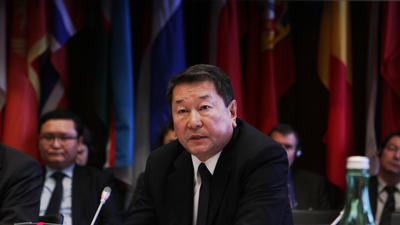-
Our work
-
Fields of work
- Arms control
- Border management
- Combating trafficking in human beings
- Conflict prevention and resolution
- Countering terrorism
- Cyber/ICT Security
- Democratization
- Economic activities
- Education
- Elections
- Environmental activities
- Gender equality
- Good governance
- Human rights
- Media freedom and development
- Migration
- National minority issues
- Policing
- Reform and co-operation in the security sector
- Roma and Sinti
- Rule of law
- Tolerance and non-discrimination
- Youth
- Field operations
- Projects
-
Meetings and conferences
- Summit meetings
- Review Conferences
- Ministerial Council meetings
- Plenary meetings of the Permanent Council
- Plenary Meetings of the Forum for Security Co-operation
- Security Review Conferences
- Annual Implementation Assessment Meetings
- Economic and Environmental Forum
- Economic and Environmental Dimension Implementation Meetings
- Human rights meetings
- Media conferences
- Cyber/ICT security conferences
- Conference of the Alliance against Trafficking in Persons
- Gender equality conferences
- Annual OSCE Mediterranean conferences
- Annual OSCE Asian conferences
- Partnerships
-
Fields of work
-
Countries
- All
-
Participating States
- Albania
- Andorra
- Armenia
- Austria
- Azerbaijan
- Belgium
- Belarus
- Bosnia and Herzegovina
- Bulgaria
- Canada
- Croatia
- Cyprus
- Czechia
- Denmark
- Estonia
- Finland – OSCE Chairpersonship 2025
- France
- Georgia
- Germany
- Greece
- Holy See
- Hungary
- Iceland
- Ireland
- Italy
- Kazakhstan
- Kyrgyzstan
- Latvia
- Liechtenstein
- Lithuania
- Luxembourg
- Malta
- Moldova
- Monaco
- Mongolia
- Montenegro
- The Netherlands
- North Macedonia
- Norway
- Poland
- Portugal
- Romania
- Russian Federation
- San Marino
- Serbia
- Slovakia
- Slovenia
- Spain
- Sweden
- Switzerland
- Tajikistan
- Türkiye
- Turkmenistan
- Ukraine
- United Kingdom
- United States of America
- Uzbekistan
- Asian Partners for Co-operation
- Mediterranean Partners for Co-operation
-
Structures and institutions
- Chairpersonship
-
Secretariat
- Secretary General
- Office of the Secretary General
- Conflict Prevention Centre
- Transnational Threats Department
- Office of the Special Representative and Co-ordinator for Combating Trafficking in Human Beings
- Office of the Co-ordinator of OSCE Economic and Environmental Activities
- Gender Issues Programme
- Opportunities for Youth
- Department of Human Resources
- Department of Management and Finance
- Office of Internal Oversight
- Documentation Centre in Prague
- Institutions
-
Field operations
- Presence in Albania
- Centre in Ashgabat
- Programme Office in Astana
- Programme Office in Bishkek
- Mission to Bosnia and Herzegovina
- Programme Office in Dushanbe
- Mission in Kosovo
- Mission to Moldova
- Mission to Montenegro
- Mission to Serbia
- Mission to Skopje
- Project Co-ordinator in Uzbekistan
- Closed field activities
- Parliamentary Assembly
- Court of Conciliation and Arbitration
- Organizational structure
- About us
Press release
Political will determines effectiveness of OSCE, Chairmanship Special Representative says at conference preparing for Summit

- Date:
- Source:
- OSCE Chairpersonship
- Fields of work:
- Conflict prevention and resolution
VIENNA, 20 October 2010 - Political will on part of OSCE participating States is a key factor for the success of the Organization, including its efforts to resolve protracted conflicts, the OSCE Chairperson-in-Office's Special Representative for Protracted Conflicts, Ambassador Bolat Nurgaliyev, said today.
Speaking to representatives of the 56 OSCE participating States at a session of the OSCE Review Conference that focuses on politico-military security, Nurgaliyev said the opportunity offered by the OSCE Summit to be held 1-2 December in Astana had to be used wisely.
"In the vital interests of the Organization's future, we have to make the Astana Summit a success, the measure of which should be its tangible contribution to comprehensive security in international, Euro-Atlantic and Eurasian arenas," he said. "Nobody can ignore that in some parts of the OSCE zone of prime responsibility, domestic or international security remains brittle."
Discussing protracted conflicts, Nurgaliyev said Kazakhstan's OSCE Chairmanship recognized that mediators, "however persuasive their arguments may sound, can achieve only a fraction if there is a lack of political will on the sides to the conflict for lasting, comprehensive settlement."
During the 17-day OSCE Review Conference, the second segment of which is underway in Vienna, the OSCE participating States review their progress in implementing the commitments they have undertaken as participants in the Organization. The meeting also prepares for the OSCE Summit, the first to be held since 1999.
The OSCE Secretary General, Marc Perrin de Brichambaut, welcomed the comprehensive review being conducted at the conference.
"In the 11 years since we last had a review of this kind, a new generation of security challenges, less easily defined by state borders and OSCE security dimensions, has emerged. The OSCE's impressive collection of conflict prevention tools could be effective in this context - if there is political will to use them," he said.
"The OSCE is a unique forum in which participating States can seek to set new directions to combat transnational threats - from organized crime and cyber threats to trafficking and terrorism. It is also well-placed to contribute to efforts to address threats emanating from Afghanistan, and to work with that country to help create stability there."
The 18-26 October meeting in Vienna focuses on the politico-military and economic and environmental dimensions of security. A first segment, held earlier this month in Warsaw, focused on human-rights related security. That dimension will be discussed again at the third Review Conference segment, to be held 26-28 November in Astana.
The agenda, updates, photos and information about the conference in English and Russian are available on the conference website: Review Conference Vienna, 18 - 26 October 2010